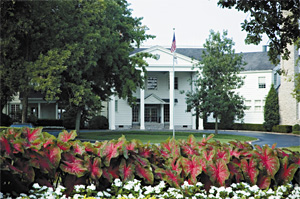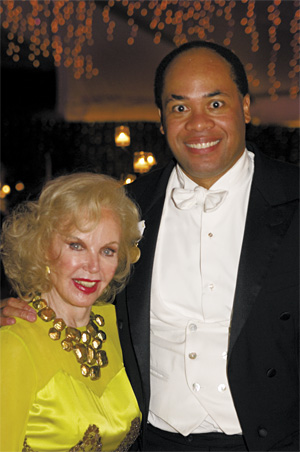When David Ewing walks into the foyer of the Belle Meade Country Club, he sees a painting of Robert E. Lee hanging over the fireplace. But the amateur historian only chuckles when asked what he thinks about being greeted by the Confederate general's portrait.
For nearly five years now, Ewing has been a candidate for membership in the tony club. If accepted into its hallowed ranks, he would become the first local African American to join in its 107-year history. The place does have a black member, attorney Richard Sinkfield. But he lives in Atlanta and only makes the four-hour trek once or twice a year.
Judging by pure aesthetics, you wouldn't think the club is worth a $40,000 fee and a five-year wait to join. The main building doesn't particularly convey an impression of power and prestige. It's a white colonial mansion with four skinny columns, fronted by a paneled exterior that looks more dated than historic. The pool is a mob of kids that backs up to the well-traveled Belle Meade Boulevard. And the centerpiece, the golf course, looks only marginally more inviting than the one at McCabe.
But Belle Meade's cachet lies with its members. In the plush dining room you'll find executives who can write a $1 million check without letting their wives know. You'll find federal judges, rain-making lawyers and a handful of unremarkable men who married remarkably well. If you snag an invitation to the Iroquois Hunt Ball, a fundraiser for Vanderbilt Children's Hospital, you'll encounter surnames like Frist and Ingram, first names like Overton and Guilford. They are descendants of the elite found in the club's dusty photographs, whose faces appear austere and presidential. It's a look that's been perfected since 1901.
Pigmentation aside, David Ewing seems an ideal candidate for these select environs. His father was a surgeon, his grandfather a teacher and preacher. Ewing's great-great-grandfather—Prince Albert Ewing—may have been the first black attorney in Nashville, launching his practice in 1871. This is the kind of breeding that puts the exclusivity in any Southern club.
David Ewing is certainly carrying on that legacy. In 2004, The Tennessean saluted him in its Top 40 Under 40 list. He's worked as a lobbyist for both Gaylord Entertainment and the Chamber of Commerce, and has served as the finance director for Congressman Jim Cooper. He now works as a lawyer for Rudy, Wood and Winstead in a stately mansion near Vanderbilt.
Ewing's civic calendar is even more robust. He heads up the Metro Board of Zoning Appeals and sits on the boards of the Nashville Symphony and Friends of Warner Parks. He also serves on an advisory board to Montgomery Bell Academy, the prestigious private school.
His is the kind of establishment cred that would make him a lock for membership. Especially since he was nominated by Ridley Wills II, who literally wrote the book on the club's history, and Lee Barfield, brother-in-law to former U.S. Senator Bill Frist and partner in Bass Berry & Sims, arguably the city's most elite law firm.
But people who track Belle Meade's highly secretive admissions process say it's unlikely Ewing will ever get in. It would mark a surprising defeat for the lawyer. After all, the club needs him far more than he needs the club.
Last year, President George W. Bush appointed Belle Meade member Gus Puryear to a federal judgeship in Tennessee's Middle District. Puryear seemed a safe pick, a devout Republican and chief counsel for Corrections Corporation of America. But his membership in Belle Meade did him in.
Though senators peppered Puryear with questions about his lack of courtroom experience, the Northern ones seemed more mesmerized by the dusty rituals of Nashville's preeminent country club. It was as if a team of archaeologists had discovered a primitive tribe freely roaming Tennessee. Sens. Ted Kennedy of Massachusetts and Russ Feingold of Wisconsin pressed Puryear to spell out the club's racial makeup. But when you've only admitted one black guy over 107 years, it's hard to come up with answers.
Now, with his patron Bush only months away from escaping back to Texas, Puryear's candidacy seems all but finished.
Accepting Ewing five years ago could have helped Puryear. Instead, his membership prospects have oddly dimmed.
Certainly the club has a history of genteel hazing. Newly relocated corporate execs have been known to cool their heels for a few years before acceptance. It's Belle Meade's version of a power play. But Ewing's wait has been agonizingly long, igniting speculation at cocktail parties and in boardrooms that there are other factors—besides old-fashioned prejudice—keeping him at bay.
Some will say that the lawyer is too much the social climber. He and his wife, Alice Randall, have a knack for landing on the society pages whenever they leave their Hillsboro Village home. Still, it's hard to blame the couple for their ubiquity. Photographers are often forced to snap photos of Dave and Alice because, outside of the help, they're the only black faces in the room. Moreover, Ewing wouldn't be the only member loathe to miss a charity ball.
Other gossips say Ewing's bona fides aren't undercut by his race, but by his wife, a best-selling author. It would be one thing if Randall wrote page-turners or intellectual treatises. But her most famous effort is The Wind Done Gone, a biting parody of the racism threaded through Gone With the Wind.
Short of mocking the New Testament or Milton Friedman, Randall could not have impeded her husband's social future more than by poking fun at this staple of Southern literature.
But others note that if the club held a prospect's wife against him, the golf course would be a lot less crowded on Sundays. Here's where a far simpler explanation rises for why Ewing's candidacy has stalled: The secret inner sanctum of the club doesn't want to see black faces at the golf course, on the tennis courts, or in swimming pool.
"They understand they can't use the N-word anymore and can't make any more outrageous statements," says one downtown attorney, who prefers not to be named when castigating his client base. "But I think some of my Republican friends who are members of the club—they're well-educated and broad-minded in many respects—but they're still racist."
Ewing declined to comment for this story. In fact, he gently tried to dissuade Scene from writing about his predicament, noting that Nashville confronts far greater issues.
But when pressed, he issued a short statement endearing for its appreciation of Southern hospitality:
"I was encouraged to apply to Belle Meade by my friends and sponsors. What happens to my application is up to the membership of the club and its leadership. Alice and I have been to many functions at the club, from the Hunt Ball to just social dinners and luncheons with friends, and we were always warmly greeted and treated with respect. And we always see a lot of friends while we're there."
Ewing is not the only black candidate up for membership—even if he's the one most people to talk about. Darrell Freeman, the former chair of the Chamber of Commerce and a successful tech entrepreneur, is also a prospect. But though he too has a notable supporter—HCA Chairman Jack Bovender—Freeman may face even longer odds than Ewing.
A 2006 Nashville Post story named Freeman as being involved in a "shakedown probe." The story was bereft of detail and almost impossible to follow. More important, nothing ever came of the supposed probe. Yet such whispering isn't the kind of lubricant that slips you into Nashville's elite clubhouse.
And Freeman may have more elemental problems: A lot of people simply don't like the guy. Even progressive whites, who realize the implications of calling a black man "arrogant," nonetheless call him just that.
If Freeman and Ewing are passed up, we'll never really know why. The club's 52-page manual, which includes rules about what carts can be driven on the course, doesn't even hint at how members are selected. Few people seem to have a clue, making it one of Nashville's most cloaked traditions.
Gil Merritt, a senior judge on the U.S. 6th Circuit Court of Appeals who inherited his father's Belle Meade membership in the 1950s, says that while many of the club's decisions are kept secret, he doesn't think anyone is hostile toward blacks. In fact, the Democratic jurist believes Belle Meade did recruit religious publisher T.B. Boyd and other African Americans to apply, but they politely declined.
"I don't think there is an exclusionary policy," says Merritt, "but they do have a secret membership committee who looks at the people up for membership and decides who gets in and who doesn't. My understanding is that they have more people who want to get in than they can accept."
Some say that the club's secret membership committee favors executives at major corporations and partners in the elite law firms. Others contend selection is tethered to family ties. In Belle Meade, few things matter more than legacy.
It all adds up to a rather mystical process, with the club's secret committee serving as a WASPy College of Cardinals. They don't have to explain who gets into the club and why, even to fellow members, though their reasoning is the stuff of legend. Talk to enough people, and you'll hear stories of men being rejected because they stole a member's girlfriend at Harpeth Hall 25 years ago.
Secrecy and pettiness make a volatile combination. So it's hardly a surprise that Ewing's candidacy is stalled. But he should take heart.
Liberal warhorse lawyer George Barrett dines at Belle Meade, though he's probably sued or antagonized half its members. He says that for all its trappings, the place has a rather ordinary appeal.
"It's like any other club. People of like interests flock together and don't want anyone to rock the boat," he says with a chuckle. "What's wrong with that?"






